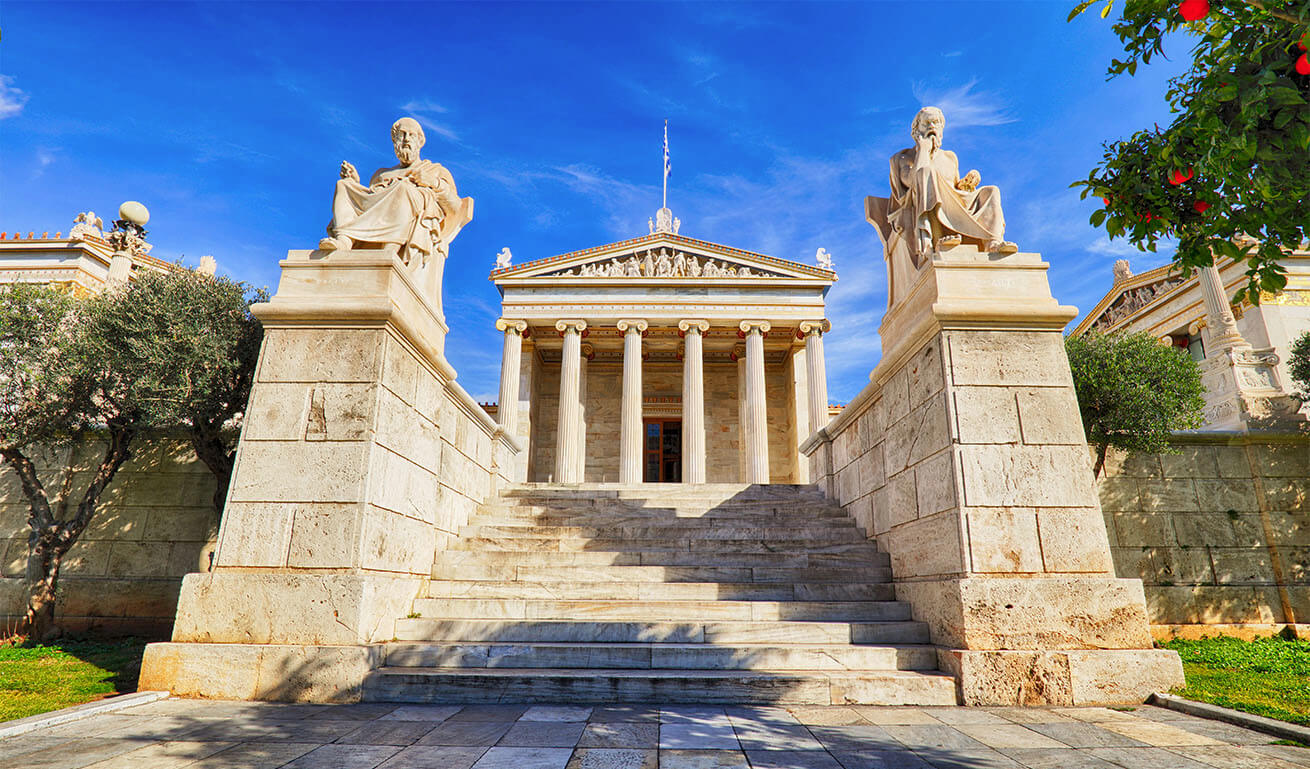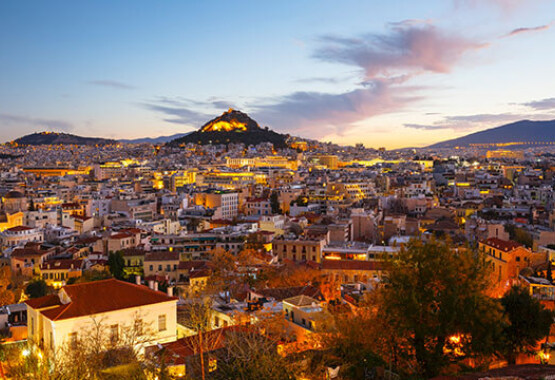An arty walk among the urban sculptures in Athens
While walking down the streets, avenues and parks of Athens you’ll be passing by some
amazing sculptures that will make your stroll all the more beautiful. They sometimes look upon us from up high, other times they simply survey our walk through the city centre. The fact is that the statues are meant to remind us of something from the past and teach us a thing or two about the future. Let’s commence our promenade and meet the urban sculptures of Athens!
Are you in? Let's meet up at Syntagma square! Here you can visit the
Monument of the Unknown Soldier in front of the Greek Parliament. It is an embossed statue of a nude male figure, depicting a dead warrior, which bears an inscription from
Pericles’ Epitaph. The monument is guarded 24/7 by the so called
Evzones and the
changing of the Guards is performed every hour on the hour. You’ll have the opportunity to view the Changing of the Guards accompanied by the military band and a large group of Evzones every
Sunday at 11.00am!
Vasilissis Sofias & Vasilissis Konstantinou Avenues
Starting from Syntagma Square there are numerous routes you can follow. On
Vasilissis Sofias Avenue you’ll see a large number of sculptures such as the one of ‘
The civilians fighting in Crete’ by Manolis Tzompanakis, located in the courtyard of the
War Museum, or ‘
Synthesis’ by Christos Kapralos (1966) and ‘
Massification’ by George Lambrou (1988) across
Rizari Park.
A little further down, you can admire the amazing
‘Runner’ sculpture (known as
Dromeas) by Costas Varotsos (1988) at the Megali tou Genous Scholi Square, in front of the former Hilton Hotel. It keeps company to the drivers of the city passing by and offers a stunning view, especially at night, when the city lights twinkle on the sculptures’ edges made of glass. It was initially placed at
Omonia Square but moved when the underground metro works began.
From here you have two routes to choose from; continue your walk towards the
north on Vassilissis Sofias Avenue, where you will see the bronze statue of ‘
Eleftherios Venizelos’ by Yiannis Pappas (1969) in Eleftherias Park as well as the impressive statue of
‘Clytemnestra’ by Chryssa (1992) made out of stainless steel, plexiglass and neon lights that adorn The
Megaron Athens Concert Hall.
If you choose to go
south, you’ll encounter the statue
‘Ideas’ meeting’ by George Kalakalla (1974) in a little piece of land amongst
Vasileos Konstantinou Avenue and Rizari, Naiadon and Sp. Merkouri Streets. The
'Discus thrower' by Kostas Dimitriadis (1927) in front of the
Panathenaic Stadium (also known as Kallimarmaro) will amaze you with its impressive frozen swing movement about to throw the discus.
Further down '
The wood breaker' statue will catch your eye. Inspired by Dimitrios Filippotis (1908) and now situated at
Zappeion, used to stand at
Amalias Avenue from 1908 to 1958 at a little square, behind the Russian Church, which was then called the wood breaker square (in Greek Plateia Xylothrafsti).
Stadiou, Panepistimiou and Akadimias Streets
Begin your stroll from Syntagma Square and see the
‘Wrestler’, the
‘Deer’ and ‘
Hermes while resting’ statues. Walk down Stadiou str. and come across the renown equestrian statue of
‘Theodoros Kolokotronis’ by Lazaros Sohos (1894) standing in front of the
Old Parliament building. Τhis statue was made out of the cannons’ material from the Castle of Palamidi in Nafplio, dating back to the Greek Revolution. In the area you will also see a sculpture of ‘
Charilaos Trikoupis’ by Thomas Thomopoulos (1920), made of marble.
Continue towards
Klafthmonos Square where you’ll run into the ‘
Memorial of National Reconciliation’ by Vassilis Doropoulos (1987) and take a turn on
Korai Pedestrian street leading to Panepistimiou St. Get your camera ready and take some shots of the amazing statues in front of the three imposing neoclassical buildings, the three Temples of Education, known as the ‘
Athenian trilogy’ consisting of the Academy, the University and the National Library.
Four sculptures adorn the Academy surrounding grounds; ‘
Athena Promachos’ and
‘Apollo’ stand high each on a column while
‘Socrates’ and
‘Plato’ sit by the entrance stairs. The sculptures of
‘Count Ioannis Kapodistrias, Governor of Greece’ and
‘Adamantios Κorais’ are located in front of the University building. Run into
‘Kostis Palamas’ statue by Vasos Falireas (1975) on Akadimias str. in the courtyard of the City of Athens Cultural Centre.
Athenas and Ermou Streets
Start from
Omonia Square and take a look at the art work ‘
Five Circles’ by George Zongolopoulos (2001) made of stainless steel. From here take
Athinas str. towards
Kotzia Square and make a stop to look at the bronze sculpture of
‘Theseus’ (Fontana Thésée) by Sophia Vari-Botero.
The
Athens City Hall courtyard is embellished by a statue of the most important man of Attica land,
‘Pericles’ created by Heinrich Faltermeier (1971). Take a turn on
Vyssis str. and reach the intersection with
Aiolou where you’ll face the brass sculpture ‘
Beneficial & Xenios Hermes’ (1993) by Alekos Fassianos. Follow
Ermou str. towards Syntagma up to the intersection with
Voulis str. and notice the bronze sculpture ‘
A dive into our world’ by Kyriakos Rokos (2000). Further up
Ermou str. at
Nikis str. meet the
Emerging Venus II by Dimitris Armakolas.
Piraios Street (Panagi Tsaldari)
If you find yourself on Piraios Street make a point in visiting
Technopolis, in
Kerameikos area of the City of Athens. Here you can admire ‘
The Globe of Peace’ sculpture by Nikos - Giorgos Papoutsidis (2000), which has five wreaths from bronze olive branches and leaves that represent the union of the five continents. Walk down to the
Benaki Museum on Piraios str. where you’ll be greeted by the ‘
Wind Signals’ by Taki (2006). These are vertical metal columns with some bulky hemispheres placed on the top, which rotate when force by air.
Kolonaki
When you will enjoy a tour in the charming neighbourhood of
Kolonaki, with its
neoclassical and
modern buildings, shops, cafés, bars and restaurants, don’t miss the chance to look at its urban sculptures. On Kaplanon Street you’ll be delighted by the marble
‘Amorgos’ sculpture by Ektor Papadakis (2009) while on Filikis Etairias Square you’ll be welcomed by the sculpted
busts of Tsakalof, Xanthos and
Anagnostopoulos, the leaders of the Greek Revolution known as Filikis Etairias. At this same spot you can also read their oath written on a column (if you read greek)!
Emmanuel Xanthos’ bust by Thomas Thomopoulos (1930) was originally located at the same square but at the place where today stands the sculpted figure of a woman known as
‘Festive’ by Giorgos Georgiades (1986).





